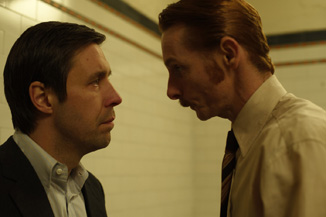Chapter Two:
Red Riding 1980
By Brett Beach
February 17, 2011
But what about the general weakness of 1980 (and the other two films by extension?) When L.A. Confidential came out in 1997, I was compelled to go back and read it and a fair number of James Ellroy’s works, including the three other novels in his L.A. Quartet and what would be the first novel in his Underworld USA trilogy, American Tabloid. Consuming those books in the space of about a month left me as paranoid, edgy, and consumed as many of Ellroy’s protagonists. Books have that effect on me. As deeply as a movie or song may become ingrained in my life, stories take up serious short-term residence in my psyche and free-basing volatile material such as Ellroy serves up, without cutting it with something a little less potent, drains me quickly.
I imagine that Peace’s novels may have the same effect, but the film adaptations do not. All the films feel too rushed to properly capture the air of all pervading institutionalized evil. We see horrific behavior on the part of the cops and we see them intentionally botching their own inquiries (for reasons that become more clear in the 1983 installment) but the cumulative effect winds up underwhelming, less than the sum of its parts. As an example, in 1980, the time between Hunter being brought on board and given carte blanche and being pulled from the investigation is barely over an hour. As viewers, we haven’t been present to nearly enough of the slog and grind and his steely determination for it to feel like he’s done enough to warrant such treatment.
My other complaint is that the cops are so vicious and so willing to take any measures to keep their ranks closed, that it seems unlikely that anyone who posed any kind of threat would be allowed to stay alive for more than 10 years (as one key supporting character is who shows up in all three films.) When it’s known that he knows something, what keeps the coppers from disappearing him? I will admit to occasionally getting lost in the morass of the plot, a fractured chronology (but not nearly so much as the novels apparently) and many mustached Brits all playing characters named John, but the central conceit that anyone would stay alive for any significant amount of time who posed even the smallest threat to these policemen seems more unbelievable as time goes on. This speaks, I guess, to how convincingly the level of corruption is captured by Tony Grisoni in his adaptations.
Marsh wasn’t an obvious choice for this series (in fact, all three directors were selected specifically to get them out of their comfort zones) and I think this installment is the least emotionally affecting of all three. I miss the poignancy he brought to his documentary Man on Wire, his ability to capture a larger than life figure and yet allow the everyman individual beneath to emerge.
To bring this back around to the idea of dead children, each installment of Red Riding has to walk that line between the gruesomeness of sordid murders as rendered in Peace’s novels and the limits of (British) television and audience members’ constitutions. The makers of the films erred on the side of the restraint and the result is a hunt for a murderer where the victims too often fade away from the foreground. Names are invoked over and over but to little effect and when the final film ends with an uncharacteristic ray of light (figuratively and literally), the lack of emotional pull is noticeable. It doesn’t feel earned and it doesn’t feel right. Tellingly, Grisoni added that bit to the resolution himself.
Next time: This column will self-destruct in seven seconds, probably with bullets and doves flying furiously in the background, if that’s possible.
Continued:
1
2
3
4

![]() Tweet
Tweet
![]() Print this column
Print this column



